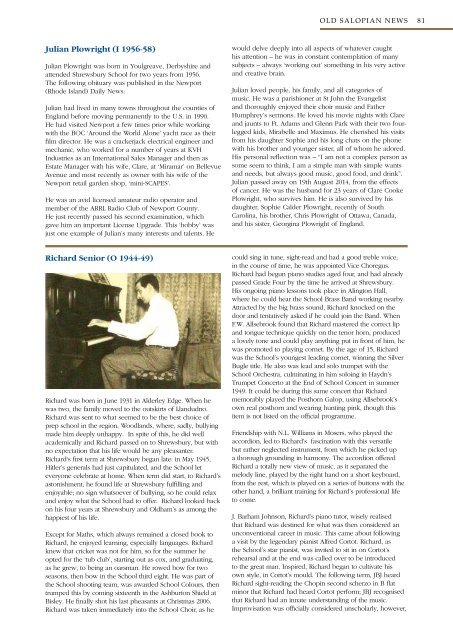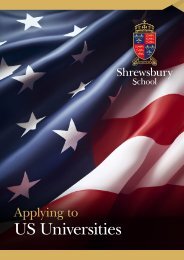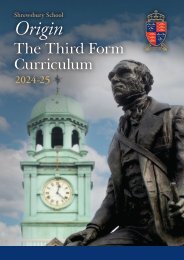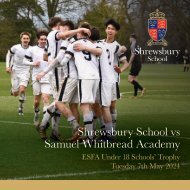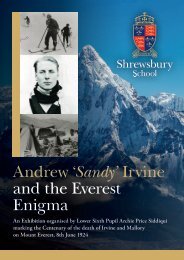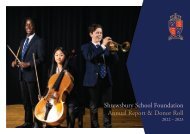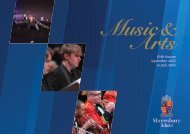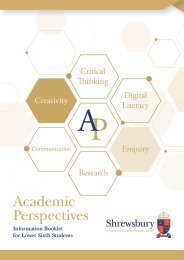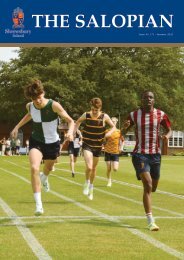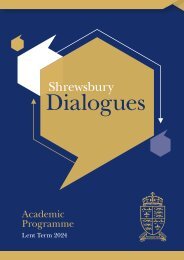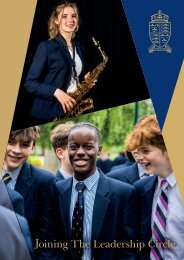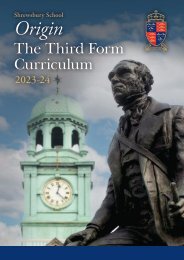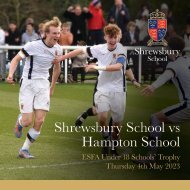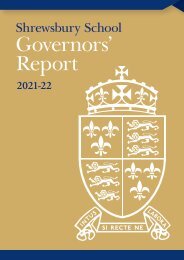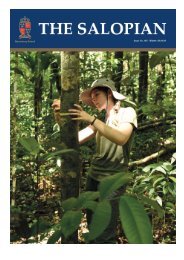The Salopian no. 157 - Winter 2015
You also want an ePaper? Increase the reach of your titles
YUMPU automatically turns print PDFs into web optimized ePapers that Google loves.
OLD SALOPIAN NEWS 81<br />
Julian Plowright (I 1956-58)<br />
Julian Plowright was born in Youlgreave, Derbyshire and<br />
attended Shrewsbury School for two years from 1956.<br />
<strong>The</strong> following obituary was published in the Newport<br />
(Rhode Island) Daily News:<br />
Julian had lived in many towns throughout the counties of<br />
England before moving permanently to the U.S. in 1990.<br />
He had visited Newport a few times prior while working<br />
with the BOC ‘Around the World Alone’ yacht race as their<br />
film director. He was a crackerjack electrical engineer and<br />
mechanic, who worked for a number of years at KVH<br />
Industries as an International Sales Manager and then as<br />
Estate Manager with his wife, Clare, at ‘Miramar’ on Bellevue<br />
Avenue and most recently as owner with his wife of the<br />
Newport retail garden shop, ‘mini-SCAPES’.<br />
He was an avid licensed amateur radio operator and<br />
member of the ARRL Radio Club of Newport County.<br />
He just recently passed his second examination, which<br />
gave him an important License Upgrade. This ‘hobby’ was<br />
just one example of Julian’s many interests and talents. He<br />
would delve deeply into all aspects of whatever caught<br />
his attention – he was in constant contemplation of many<br />
subjects – always ‘working out’ something in his very active<br />
and creative brain.<br />
Julian loved people, his family, and all categories of<br />
music. He was a parishioner at St John the Evangelist<br />
and thoroughly enjoyed their choir music and Father<br />
Humphrey’s sermons. He loved his movie nights with Clare<br />
and jaunts to Ft. Adams and Glenn Park with their two fourlegged<br />
kids, Mirabelle and Maximus. He cherished his visits<br />
from his daughter Sophie and his long chats on the phone<br />
with his brother and younger sister, all of whom he adored.<br />
His personal reflection was – “I am <strong>no</strong>t a complex person as<br />
some seem to think, I am a simple man with simple wants<br />
and needs, but always good music, good food, and drink”.<br />
Julian passed away on 19th August 2014, from the effects<br />
of cancer. He was the husband for 23 years of Clare Cooke<br />
Plowright, who survives him. He is also survived by his<br />
daughter, Sophie Calder Plowright, recently of South<br />
Carolina, his brother, Chris Plowright of Ottawa, Canada,<br />
and his sister, Georgina Plowright of England.<br />
Richard Senior (O 1944-49)<br />
Richard was born in June 1931 in Alderley Edge. When he<br />
was two, the family moved to the outskirts of Llandud<strong>no</strong>.<br />
Richard was sent to what seemed to be the best choice of<br />
prep school in the region, Woodlands, where, sadly, bullying<br />
made him deeply unhappy. In spite of this, he did well<br />
academically and Richard passed on to Shrewsbury, but with<br />
<strong>no</strong> expectation that his life would be any pleasanter.<br />
Richard‘s first term at Shrewsbury began late: in May 1945,<br />
Hitler’s generals had just capitulated, and the School let<br />
everyone celebrate at home. When term did start, to Richard’s<br />
astonishment, he found life at Shrewsbury fulfilling and<br />
enjoyable; <strong>no</strong> sign whatsoever of bullying, so he could relax<br />
and enjoy what the School had to offer. Richard looked back<br />
on his four years at Shrewsbury and Oldham’s as among the<br />
happiest of his life.<br />
Except for Maths, which always remained a closed book to<br />
Richard, he enjoyed learning, especially languages. Richard<br />
knew that cricket was <strong>no</strong>t for him, so for the summer he<br />
opted for the ‘tub club’, starting out as cox, and graduating,<br />
as he grew, to being an oarsman. He rowed bow for two<br />
seasons, then bow in the School third eight. He was part of<br />
the School shooting team, was awarded School Colours, then<br />
trumped this by coming sixteenth in the Ashburton Shield at<br />
Bisley. He finally shot his last pheasants at Christmas 2006.<br />
Richard was taken immediately into the School Choir, as he<br />
could sing in tune, sight-read and had a good treble voice;<br />
in the course of time, he was appointed Vice Choregus.<br />
Richard had begun pia<strong>no</strong> studies aged four, and had already<br />
passed Grade Four by the time he arrived at Shrewsbury.<br />
His ongoing pia<strong>no</strong> lessons took place in Alington Hall,<br />
where he could hear the School Brass Band working nearby.<br />
Attracted by the big brass sound, Richard k<strong>no</strong>cked on the<br />
door and tentatively asked if he could join the Band. When<br />
F.W. Allsebrook found that Richard mastered the correct lip<br />
and tongue technique quickly on the te<strong>no</strong>r horn, produced<br />
a lovely tone and could play anything put in front of him, he<br />
was promoted to playing cornet. By the age of 15, Richard<br />
was the School’s youngest leading cornet, winning the Silver<br />
Bugle title. He also was lead and solo trumpet with the<br />
School Orchestra, culminating in him soloing in Haydn’s<br />
Trumpet Concerto at the End of School Concert in summer<br />
1949. It could be during this same concert that Richard<br />
memorably played the Posthorn Galop, using Allsebrook’s<br />
own real posthorn and wearing hunting pink, though this<br />
item is <strong>no</strong>t listed on the official programme.<br />
Friendship with N.L. Williams in Mosers, who played the<br />
accordion, led to Richard’s fascination with this versatile<br />
but rather neglected instrument, from which he picked up<br />
a thorough grounding in harmony. <strong>The</strong> accordion offered<br />
Richard a totally new view of music, as it separated the<br />
melody line, played by the right hand on a short keyboard,<br />
from the rest, which is played on a series of buttons with the<br />
other hand, a brilliant training for Richard’s professional life<br />
to come.<br />
J. Barham Johnson, Richard’s pia<strong>no</strong> tutor, wisely realised<br />
that Richard was destined for what was then considered an<br />
unconventional career in music. This came about following<br />
a visit by the legendary pianist Alfred Cortot. Richard, as<br />
the School’s star pianist, was invited to sit in on Cortot’s<br />
rehearsal and at the end was called over to be introduced<br />
to the great man. Inspired, Richard began to cultivate his<br />
own style, in Cortot’s mould. <strong>The</strong> following term, JBJ heard<br />
Richard sight-reading the Chopin second scherzo in B flat<br />
mi<strong>no</strong>r that Richard had heard Cortot perform; JBJ recognised<br />
that Richard had an innate understanding of the music.<br />
Improvisation was officially considered unscholarly, however,


